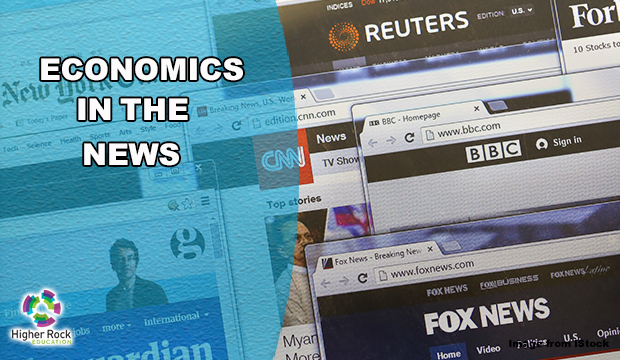
Economics in the News – Nov. 21-27, 2022
Economics impacts our lives every day. Below are some of the top storylines from this past week related to economics.
o The World Cup has begun. Soccer’s superstars made the trek to Qatar to play in a World Cup unlike any other. Years of coordination and planning took shape, as soon as FIFA announced that the World Cup would be played in a small Middle East country for the first time ever.
As part of the planning for the World Cup and to accommodate hundreds of thousands of tourists, Qatar built a new city. Lusail City, 20 kilometers or 12 miles, from Qatar capital Doha was built to accommodate World Cup fans and Qatar residents. Plans for the city had been around since 2005, but the World Cup expedited the process. It’s backed by Qatar’s $450 billion sovereign wealth fund is connected to Doha by a new metro system. But the new city sits mostly empty even during the World Cup, raising questions about how much use the infrastructure will serve after the tournament. [Associated Press]
o The COVID-19 pandemic, Russia’s invasion of Ukraine and other global disruptions have all exposed consumers to supply disruptions that drive up prices. Food prices globally are 25 percent higher than before COVID-19 caused a global shutdown in early 2020, according to the United Nations Food Price Index.
Experts predict that food prices will continue to rise due to energy shortages, supply issues and high fertilizer costs. In modern times, the amount of food being imported has increased. The United States imported 18.3 percent of food and beverages in 2020, an increase of five percent from 2008. Wheat consumption sourced from abroad rose to 25 percent in 2019 from 17 percent in 1995, globally. [The Wall Street Journal]
o Did you go Black Friday shopping? Early indications are smaller crowds, which was expected as high inflation and the evolvement over time. Many large retailers have been offering Black Friday deals since October to offload inventory.
Consumers have also changed their shopping habits, buying the necessities like food and gasoline. The rise of e-commerce has vastly changed the Black Friday shopping experience. A Pew Research study found that shoppers are increasingly reliant on social media. The National Retail Federation has said the average shopper will spend $832.84 on gifts and holiday items this year, which is about the 10-year average. [The Washington Post]
o The largest rail unions across the United States are threatening to go on strike, which could start as soon as Dec. 5. Rail workers are fighting for better schedules and more sick time. A potential rail strike would be devastating for the economy, as Congress is expected to intervene and impose contract terms with rail workers. A rail strike last occurred in the United States in 1992, lasting two days.
A potential rail strike would have damaging impacts throughout the economy, as raw materials, food, fuel, cars, and chemicals are transported daily. Railroads account for an estimated 40 percent of the nation’s freight each year. A potential strike would cost the economy $2 billion a day in a report released earlier this year. Chemical manufacturers and refineries would be among the first to feel the impacts. About 30 percent of food is transported by rail. It’s estimated that it would take about a week before customers begin to notice shortages of their favorite cereals and peanut butter at the grocery store. Online orders would be impacted, as shippers such as FedEx and UPS use rail cars that hold roughly 2,000 packages in each car. [FORTUNE]
o Iconic Manchester United – one of the world's most prized sports franchises- may soon have new owners. The Glazer family, who has owned the club since 2005 and also own the NFL’s Tampa Bay Buccaneers, announced that they have hired advisors to find outside investors or sell the team.
Shares of the club gained nearly 30 percent on the New York Stock Exchange in the immediate aftermath of the Glazer announcement, reaching a valuation of nearly $2.8 billion. Manchester United rival Chelsea FC sold for $5.1 billion in May to a group led by private equity firm Clearlake Capital. But Manchester United is expected to bring a higher price because it has significantly more global reach, popularity and brand power than Chelsea. [The New York Times]